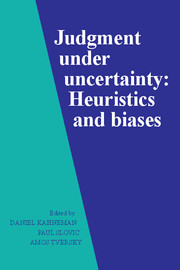Book contents
- Frontmatter
- Contents
- List of contributors
- Preface
- Part I Introduction
- Part II Representativeness
- Part III Causality and attribution
- Part IV Availability
- Part V Covariation and control
- Part VI Overconfidence
- 20 Overconfidence in case-study judgments
- 21 A progress report on the training of probability assessors
- 22 Calibration of probabilities: The state of the art to 1980
- 23 For those condemned to study the past: Heuristics and biases in hindsight
- Part VII Multistage evaluation
- Part VIII Corrective procedures
- Part IX Risk perception
- Part X Postscript
- References
- Index
21 - A progress report on the training of probability assessors
Published online by Cambridge University Press: 05 May 2013
- Frontmatter
- Contents
- List of contributors
- Preface
- Part I Introduction
- Part II Representativeness
- Part III Causality and attribution
- Part IV Availability
- Part V Covariation and control
- Part VI Overconfidence
- 20 Overconfidence in case-study judgments
- 21 A progress report on the training of probability assessors
- 22 Calibration of probabilities: The state of the art to 1980
- 23 For those condemned to study the past: Heuristics and biases in hindsight
- Part VII Multistage evaluation
- Part VIII Corrective procedures
- Part IX Risk perception
- Part X Postscript
- References
- Index
Summary
In prescriptive analyses of decisions under uncertainty, decision makers and their expert advisors are often called upon to assess judgmental probability distributions of quantities whose values are unknown to them. This chapter discusses some empirical findings addressed to such questions as: How well can untrained individuals perform such assessments? Do they manifest certain recurrent biases? How can assessors be calibrated? How can they be taught to become better assessors?
This chapter deals only with assessments of uncertain quantities that can be thought of as taking on a continuum of possible values. Hence we shall work exclusively with univariate density functions and their cumulative distribution functions. Several different procedures are available for assessing probability distributions of continuous, univariate random variables, but we shall consider only one particular procedure that we and our colleagues have often used in practice. It is called the method of direct fractile assessments.
Information
- Type
- Chapter
- Information
- Judgment under UncertaintyHeuristics and Biases, pp. 294 - 305Publisher: Cambridge University PressPrint publication year: 1982
Accessibility standard: Unknown
Why this information is here
This section outlines the accessibility features of this content - including support for screen readers, full keyboard navigation and high-contrast display options. This may not be relevant for you.Accessibility Information
- 319
- Cited by
